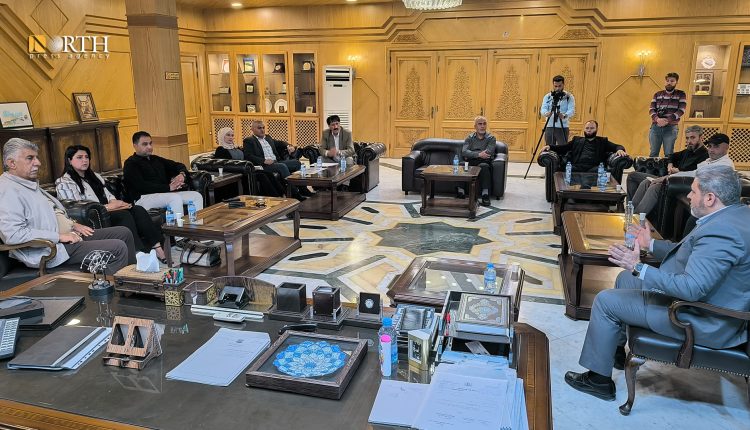Aleppo Kurdish Neighborhoods Council Meets Syrian Government Council to Bolster Service Coordination
By Kardo Roj
ALEPPO, Syria (North Press) – A municipal delegation from the Kurdish Sheikh Maqsoud and Ashrafiyeh neighborhoods in Aleppo visited the Aleppo Syrian Government Provincial Council on Monday to discuss ways to improve public service coordination and implement provisions of a recently signed agreement between the Syrian government and the Syrian Democratic Forces (SDF).
The five-member delegation, led by the co-presidency of the People’s Municipality in the two predominantly Kurdish neighborhoods, met with Mohammad Ali al-Aziz, head of Aleppo’s Provincial Council, along with other municipal officials. Discussions focused on key service sectors including water, electricity, sanitation, and road maintenance.
This rare face-to-face meeting represents the second such encounter aimed at increasing cooperation between the People’s Municipality and Syrian government institutions. While the neighborhoods of Sheikh Maqsoud and Ashrafiyeh fall within Aleppo city limits, they are administered by the Autonomous Administration of North and East Syria (AANES), with security provided by local forces linked to the SDF.
According to North Press’ correspondent in Aleppo, the talks were grounded in the shared interest of alleviating chronic service disruptions that have long affected the two neighborhoods. Attendees revisited the impacts of previous government-imposed blockades and the historical lack of state services.
In recent years, Sheikh Maqsoud and Ashrafiyeh have faced significant challenges, particularly during the conflict’s earlier stages when regime forces restricted humanitarian access. These areas have since become relatively stable, functioning under AANES governance but in proximity to regime-controlled zones—necessitating occasional coordination on critical urban issues.
Amineh Bayram, co-president of the People’s Municipality in the two neighborhoods, told North Press that the session was “productive and free of tension,” signaling a positive shift in tone. “This is the second meeting with the provincial council to improve coordination. It’s a good step, and all sides are showing willingness to cooperate,” she said.
Bayram confirmed that joint committees will be formed to tackle issues such as sewage systems, road repair, water supply, and electricity distribution. These committees will include representatives from both the People’s Municipality and relevant departments within Aleppo’s local government.
She also noted that the Provincial Council pledged to treat the two neighborhoods equitably, promising the allocation of resources and services on par with other districts in Aleppo.
“Going forward, we will continue holding regular sessions to ensure that unresolved problems are addressed collectively,” she added.
The visit marks a rare moment of pragmatic cooperation between parallel governance structures within Syria. Although political divisions remain, local administrations under the AANES have increasingly sought engagement with national-level institutions to address the urgent needs of civilians.
In Sheikh Maqsoud and Ashrafiyeh—areas known for their resilience and grassroots organization—the local administration has played a critical role in maintaining services, security, and community cohesion. With SDF-affiliated internal security maintaining stability, these neighborhoods have also served as a model for bottom-up governance during Syria’s prolonged fragmentation.
However, such coordination efforts remain sensitive. While there was no formal recognition of AANES authority by the Aleppo government, the mutual acknowledgment of responsibilities in service delivery suggests a pragmatic approach is evolving on the ground.

